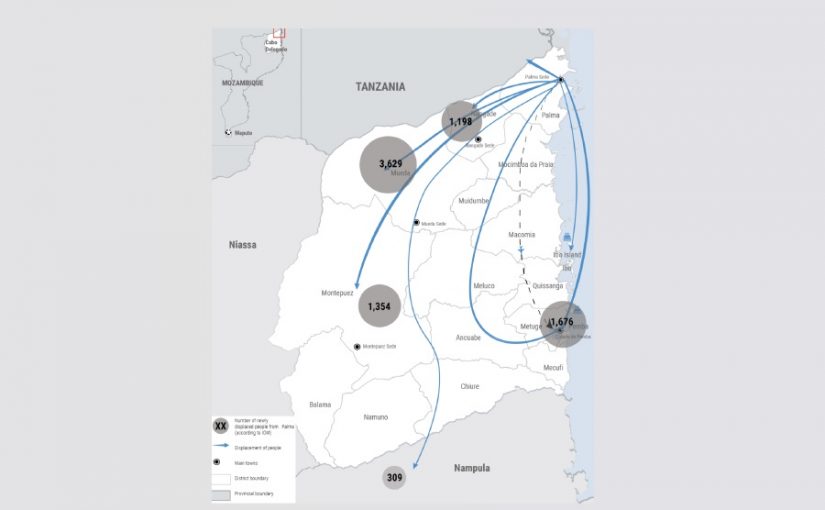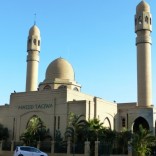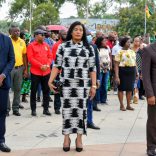Mozambique: Confirmed mpox cases have fallen to 16 - AIM report
Mozambique – Attacks in Palma District, Flash Update No.3 (Last updated: 31 Mar 2021)

As of 31 March 2021. Source: IOM/DTM
Highlights
More than 8,100 people who fled the violence in Palma have arrived in Nangade, Mueda, Montepuez and Pemba districts since 24 March.
Many more people remain displaced inside of Palma—including thousands who have reportedly gathered near the Afungi complex— where the security situation remains volatile.
Despite immense challenges, humanitarians are assisting people newly displaced by the conflict, including providing food assistance, water and health services, and identifying the most vulnerable for tailored support.
More resources are immediately required to meet the needs of people fleeing violence in Palma.
Situation overview
Following attacks by non-state armed groups and ongoing clashes in Palma which began on 24 March, 8,166 displaced people have been registered at arrival points in Nangade, Mueda, Montepuez and Pemba districts, according to the International Organization for Migration (IOM). Thousands more people fleeing the conflict have arrived today in Pemba and other locations and are still being registered by IOM and its partners. There are also thousands of displaced people who remain near Palma town, including around the Afungi complex, where people have arrived dehydrated, hungry and in shock, according to Medecins Sans Frontiers (MSF).
Hundreds of people are still trying to leave Palma and thousands are making their way by foot, boat and road to safer destinations, including towards neighbouring Nampula Province, according to humanitarians on the ground. There are unverified reports of thousands of people hiding in the bush surrounding Palma, without access to food or water. UNHCR has also received unconfirmed information that an undetermined number of Mozambicans may have crossed into Tanzania via informal entry points.
The UN Humanitarian Air Service (UNHAS), operated by the World Food Programme (WFP), and other civil society groups are supporting the evacuation efforts. At least 18 sailing boats, carrying around 45 people each, arrived in Paquitequete, in Cabo Delgado’s capital Pemba, on 30 March, according to humanitarians. An additional boat, carrying more than 1,000 people, is expected to arrive in Pemba tomorrow, 1 April.
The security situation in Palma is still reportedly volatile, although information remains extremely difficult to verify due to telecommunications being down in Palma town. The attack in Palma is the most recent major incident in the conflict in Cabo Delgado, which began in October 2017. In 2020, the number of people displaced across the province rose from around 90,000 in January to more than 670,000 in December.
In a joint statement, the Special Representative for Children and Armed Conflict, Virginia Gamba, the Special Representative for Sexual Violence in Conflict, Pramila Patten, and the Special Representative for Violence against Children, Najat Maalla M’jid, strongly condemned the horrific acts of violence reported in Cabo Delgado, and underscored that the protection and humanitarian needs of the civilians, especially women and children, must be urgently addressed.
Humanitarian response
Despite immense challenges, humanitarians are responding and assisting people newly displaced by the conflict. UNHAS has been supporting evacuations of the most vulnerable people in Palma and delivering emergency supplies, including high energy biscuits and water, as well as connecting service providers to people in need of medical transport and social services. As of 31 March, at least 335 people had been rescued by UNHAS.
WFP and Food Security partners have pre-positioned 200 immediate response kits (IRRs) in Mueda, enough to feed around 1,000 people, in addition to the emergency food packages already being provided to people arriving in Pemba. WFP aims to reach up to 50,000 people impacted by the attack.
UNFPA and partners working on sexual and reproductive healthcare and gender-based violence are pre-positioning birthing kits and essential drugs to support pregnant women and new mothers that are amongst the displaced population, and distributing dignity kits with essential female hygiene and other items to women and girls arriving in Pemba. The agency is also mobilizing personnel to scale up training of health care providers to strengthen the delivery of essential health and protection services, including for preventing and supporting survivors of gender based violence.
The Health Cluster is supporting efforts to assist and transfer injured and ill people from Pemba’s port and airport to the Provincial Hospital, and from Nampula to the referral hospital. Partners are also supporting ambulances at the arrival points to enable the transfer of people in need of medical assistance. WHO, ICRC and the Mozambique Red Cross Society have provided medical supplies, including trauma kits, to the Cabo Delgado’s Provincial Hospital. Additional medical kits provided by MSF were also sent to Mueda, Nangade and Palma districts.
Protection partners are assisting displaced people who are arriving into safer locations, including children who have been separated from their families as they fled the violence. UNICEF is registering unaccompanied children and ensuring they receive holistic support, including psychosocial support services, while working to reunite the children with their families as quickly as possible.
Humanitarian funding
Additional funding is urgently required to enable humanitarians to meet the needs of people fleeing the violence in Palma.
The humanitarian appeal for the Cabo Delgado crisis, which calls for US$254 million to respond to the urgent needs of 1.1 million people in Cabo Delgado, Nampula and Niassa in 2021, is currently just 1 per cent funded.
- You may download this report’s PDF HERE.












Leave a Reply
Be the First to Comment!
You must be logged in to post a comment.
You must be logged in to post a comment.